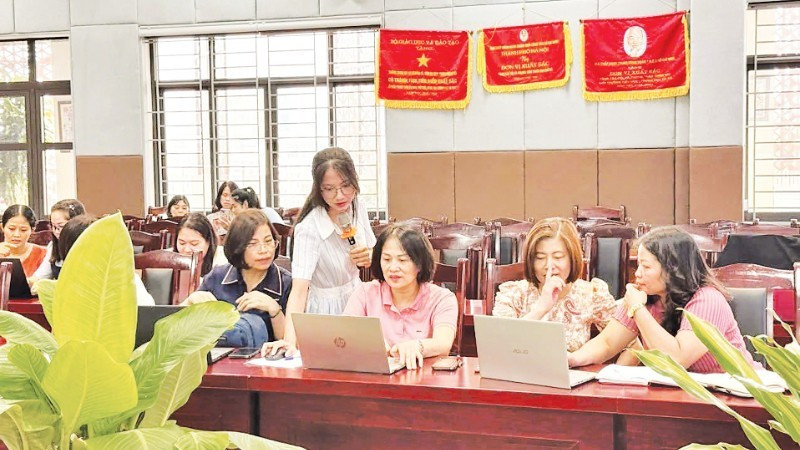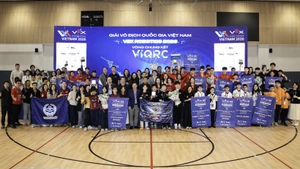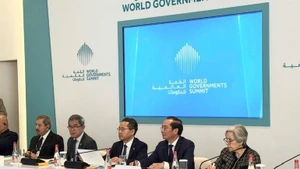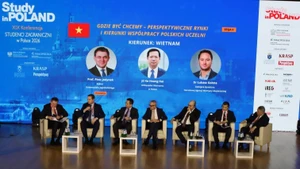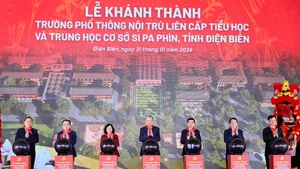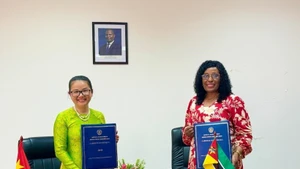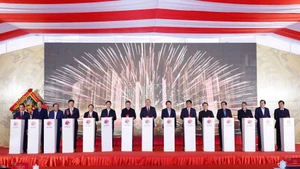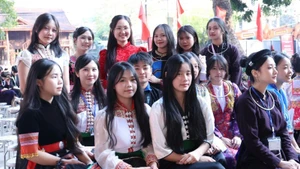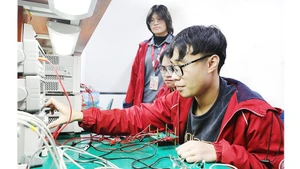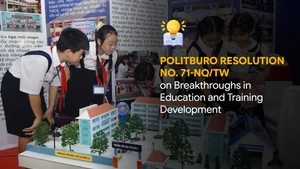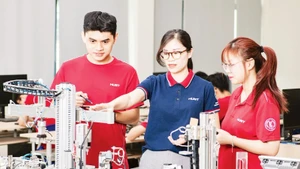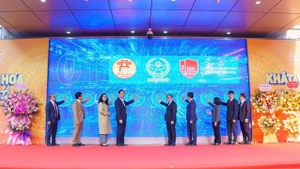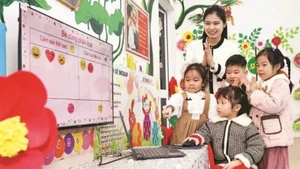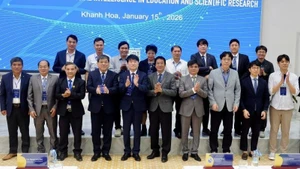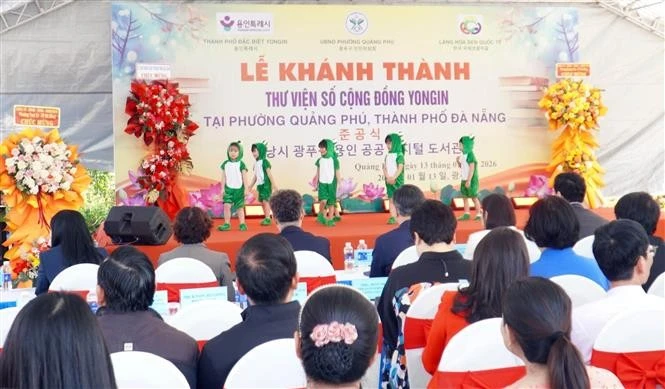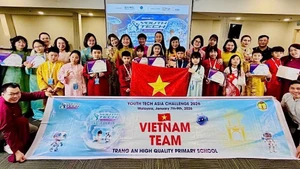As a result, contests for excellent and specialised students, as well as other academic competitions, have seen many positive outcomes, creating motivation for competition, renewal and innovation in teaching and learning.
Implementing comprehensive solutions
In line with Resolution No. 57-NQ/TW dated December 22, 2024 of the Politburo on breakthroughs in the development of science, technology, innovation and national digital transformation, from the 2025–2026 school year, Giang Vo Secondary School (Giang Vo Ward, Ha Noi) has launched the “Google Digital Classroom” model.
Principal To Thi Hai Yen noted that in recent years, the school has continuously strived to rise, asserting its standing and educational quality not only within the ward but also in Ha Noi’s education sector and nationwide. Specifically, the proportion of pupils achieving good and excellent results has been high; many students have won top prizes in national and international competitions, earning direct admission or passing entrance exams to specialised high schools.
With the “Google Digital Classroom”, the school aims to improve the quality of elite education, develop the qualities and competences of pupils in line with the 2018 general education curriculum, moving towards becoming global digital citizens. All pupils in the three “elite” grade 6 classes (Literature, Mathematics and English) participating in the digital classroom are equipped with tablets for study under the instruction and supervision of trained and certified teachers. From the 2026–2027 academic year onwards, depending on actual conditions, the school plans to expand the “Google Digital Classroom” model, aiming to build a “Google Digital School”.
In Ninh Binh Province, Truong Han Sieu Lower Secondary School (Hoa Lu Ward) has consistently maintained its leading position in gifted education across the province. Principal Trinh Thi Van Khanh shared: “The quality of the school’s gifted education can be most clearly recognised through the high school entrance examinations and provincial, national, and international competitions for excellent students.”
Principal Doan Thi Kim Dung of A Nguyen Hue Secondary School stated that since 2021, the school has ranked first among non-specialised high schools in training excellent students; many have achieved high results in national competitions. These results were achieved thanks to the implementation of a number of consistent, long-term solutions to improve education quality.
Affirming international standing
In 2025, the Ministry of Education and Training celebrated the 80th anniversary of the education sector with many remarkable achievements. In the field of quality management, the Department of Quality Management under the Ministry of Education and Training advised the minister and the sector in successfully organising many key tasks.
Notably, the 2025 High School Graduation Examination — the first to be held under the 2018 General Education Programme — was organised in a professional, safe, serious, and objective manner. The quality of gifted education has also continued to be affirmed through national, regional, and international competitions.
In 2025, Viet Nam sent seven student delegations to regional and international Olympiads, with 37 participants winning medals: 13 gold, 16 silver and eight bronze. All teams ranked in the Top 10 worldwide in terms of gold medals won; every team secured at least one gold medal. Compared with 2024, this year’s results marked an increase of one gold medal.
In 2025, Viet Nam sent seven student delegations to regional and international Olympiads, with 37 participants winning medals: 13 gold, 16 silver and eight bronze. All teams ranked in the Top 10 worldwide in terms of gold medals won; every team secured at least one gold medal. Compared with 2024, this year’s results marked an increase of one gold medal.
Professor Dr Huynh Van Chuong, Head of the Department of Quality Management, said the Ministry of Education and Training highly appreciated the attention of provincial departments and localities in discovering and training excellent students, as well as the efforts of pupils and teachers. The department continues to provide advice, implement initiatives and offer support to create a useful and fair platform in excellence-oriented science for all students with a passion for science to fully develop their abilities and strengths.
In the coming period, the selection of excellent students will be adjusted to provide more opportunities for a greater number of students to take part, regardless of whether they are from specialised schools or non-specialised schools. The exam content will closely follow the 2018 General Education Programme.
In recent years, the department of has acted as the focal point, advising and presiding over the organisation of many large-scale international assessments for pupils nationwide, implemented by prestigious organisations such as the Organisation for Economic Co-operation and Development (OECD) and the Southeast Asian Ministers of Education Organization (SEAMEO), in accordance with the government and ministry’s integration commitments. Achievements in these programmes have been relatively high, helping to affirm the quality of Viet Nam’s education.
The PISA 2022 result is a prime example. This has been regarded as one of Viet Nam’s highlights in the eyes of the international community, demonstrating educational effectiveness that surpasses the level of investment resources.
Alongside Programme for International Student Assessment (PISA), at the primary level, Viet Nam participated for the first time in the Southeast Asia Primary Learning Metrics (SEA-PLM) in 2019 and excelled in leading all three domains — reading, writing and mathematics — among the six ASEAN countries taking part. In 2024, Viet Nam continued its participation, and preliminary results indicate that it has maintained its leading position in all three domains, with the official results to be announced in due course.
At the same time, Viet Nam is also implementing a large-scale assessment programme for pupils in grades 5, 9 and 11 regarding Teaching and Learning International Survey (TALIS), organised by the OECD. To achieve such results, the Ministry of Education and Training has intensified training so that teachers master and apply regional and international assessment methods; pupils are guided in practising competency-based exercises, stimulating intelligence and maximising creativity.
The implementation of large-scale assessment programmes provides vital information about teaching and learning activities and related conditions in general education, thereby offering policy recommendations on teaching, testing and assessment, contributing to improving education quality and developing pupil competences.
